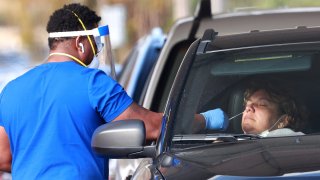
As cases of the omicron variant continue to surge in North Texas, the Tarrant County District Attorney's Office is warning residents to be on the lookout for fake COVID-19 testing sites looking to steal personal information.
The DA's office said fake pop-up testing sites are being reported across the country and that some of the scammers are asking for credit card and Social Security numbers, which should be a red flag.
“We believe what’s driving demand for this is the rapid testing across the country is causing limited supplies of the tests and this is leaving an opportunity for pop-up locations that may be employing some questionable practices,” said Monica Horton, spokesperson for the BBB of North Central Texas.
One person in Fort Worth reported a pop-up site where staff was reportedly instructing everyone to state they had no insurance. The complainant said they never received their test results and were told to come in for another test. They are now worried the government is being charged for services not provided.
Get top local stories in DFW delivered to you every morning. >Sign up for NBC DFW's News Headlines newsletter.
"Be careful," Tarrant County Criminal District Attorney Sharen Wilson said. "Research the facilities before you go and make sure it's a valid testing site."
PROTECT YOURSELF
- Research the facility or testing site before you go. The U.S. Food and Drug Administration has information at www.fda.gov.
- Talk to your doctor. He or she can help you find a legitimate testing site. When in doubt, go to sites affiliated with local hospitals or city or county government.
- Keep your personal information - Social Security numbers, credit card numbers - to yourself. Legitimate testing sites won't ask for your Social Security number or a credit card number.
- Avoid unverified websites offering COVID-19 tests.
- Contact the Better Business Bureau to report a fraud or scam at www.bbb.org/scamtracker.
- NBCDFW is also keeping a list of testing sites on this page.
“These crooks understand that people are desperate to get a test,” said Lloyd Whelchel, who heads the Tarrant County District Attorney’s White Collar Crimes team. “They want your name, your date of birth, they want your credit card number, they want your bank account information.”
Coronavirus Pandemic
Full coverage of the COVID-19 outbreak and how it impacts you
Convicted criminals could face life in prison.
“They’re preying on people in need,” he said. “Some sites can be fairly sophisticated from what we’ve been seeing across the nation or some of them can be just as simple as a pop-up tent.”
Whelchel says testing sites should not ask for your social security number or credit/bank card information.
“When you go to these sites, you can ask: What test are you going to run? What lab are you going to use and what’s your healthcare credentials and if they can’t answer those questions, then you don’t need to be there,” he said.
"Scarcity often leads to potential scams for a product that doesn't exist, the compromise of personally identifiable information, or the increase of deceptive advertising," the BBB warning states.
Anyone caught fraudulently gathering personal information such as credit card or Social Security numbers faces a variety of charges.
If there are less than five items of personal information gathered, the offender faces a state jail felony which carries a jail term of up to two years and a fine of up to $10,000. If there are more than 50 items of personal information gathered, they face a first-degree felony that carries a prison term of five to 99 years and a fine of up to $10,000.


